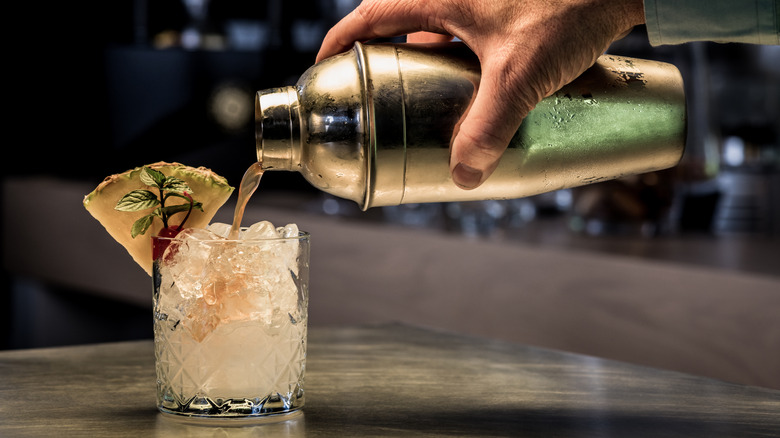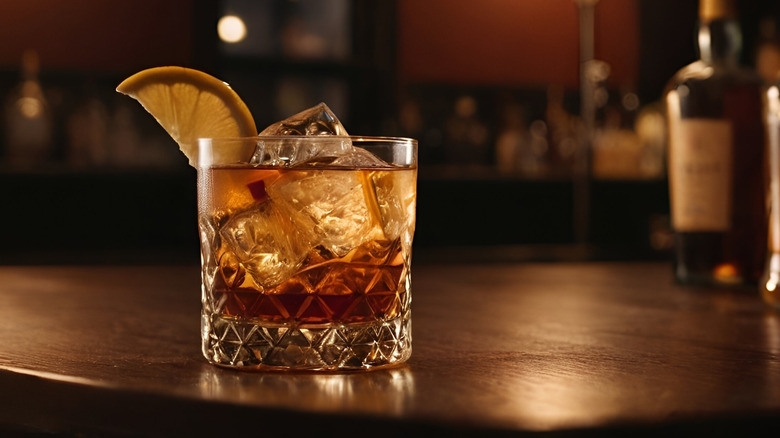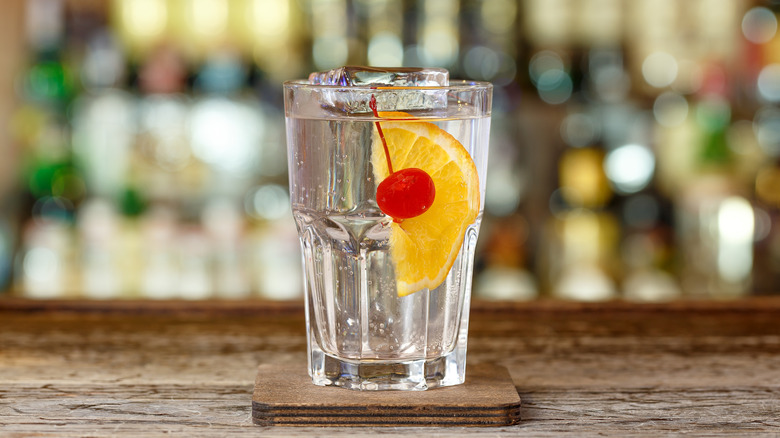How To Choose The Right Type Of Ice For Your Cocktail
We may receive a commission on purchases made from links.
Choosing the right ice can mean the difference between impressing guests with a memorable cocktail or producing a humble attempt that's off the mark. That's because ice serves many functions: chilling a drink, impacting taste, and providing a lovely aesthetic. Lucky for you, dear reader, selecting the best ice for a cocktail doesn't have to be complicated. Generally speaking, ice in any form is better than none at all, unless you're making a "neat" cocktail. If you have several types of ice to choose from, a good rule of thumb is to use crushed ice for long, sweet drinks. Large cubes are preferred when making shorter, stronger cocktails. Remember, the characteristics of your drink — and what kind of drinking experience you are trying to create — should always dictate what type of ice you use.
If you're curious about why some cocktails use cubes while others use spheres, crushed ice, or a Collins spear, keep reading. There's more strategy and science behind selecting the right ice than you might think. Consider this your personal guide to choosing ice for a cocktail — you'll discover the five most common types of ice used in cocktails and learn why choosing the right ice matters so darn much.
When to use an ice cube
Let's start with plain old cubes, the O.G. versatility player. Due to their uniform size, 1-inch cubes are great for shaking or stirring a drink in a shaker because they chill a cocktail quickly and diminish the alcohol's strong taste. This ensures the drink is smooth from the very first sip. Beyond keeping drinks cold, the cubes melt somewhat slowly, so the beverage you're imbibing keeps its bright, acidic, sweet, or smoky flavors without tasting watery or dull. Much like a pinch hitter, these basic cubes work well as a substitute if you're out of other options to ice a drink. Use 1-inch cubes for mixed cocktails that you or a guest will enjoy rather speedily, such as a jack and coke, vodka (or gin) and tonic, or any other spirit and mixer combination. A good rule of thumb is to always have some on hand. After all, you never know when you'll need it, and water takes a surprisingly long time to freeze.
Sometimes, selecting a 2-inch cube is more appropriate. If you know that you'll be nursing a drink for more than 15 minutes, drop a 2-inch cube into a rocks glass before adding the liquid. The additional inch takes up more area (and volume), and almost brings the dilution process to a halt. This keeps your drink cold without tampering with the integrity of your scotch, whiskey, or other alcohol of choice. Make 2-inch cubes using special ice trays and use them for spirits served on the rocks and for classic, strong cocktails like a Manhattan, an old fashioned, or a negroni, a cocktail that Anthony Bourdain loved.
When to use novelty ice options
To many, crushed ice is synonymous with slushies and for good reason: Small, diced ice dilutes the powerful punch imparted by sugary-sweet soda drinks. This rule also applies to cocktails. For drinks that contain simple syrups, fruit juices, and other saccharine flavors, crushed ice creates balance while also cooling the beverage. If you can't get crushed ice from your refrigerator door, put cubed ice in a plastic bag and gently crush it with a rolling pin until it breaks into small, even bits. Use crushed ice for a mint julep, Moscow mule, black sabbath, and other cocktails that call for several sweet ingredients.
The inclusion of an ice sphere improves many drinks because it melts gradually and creates a stunning visual display. However, it has less surface area than a cube, so you'll need to stir your cocktail to evenly distribute the cold from the ice throughout the glass. Use ice spheres in a rocks glass to serve spirits, or strong cocktails like a whiskey sour.
As the name suggests, Collins spears are specially crafted for a Collins glass. (If you want to add this ice to your freezer, pick up this mold.) These long, rectangular ice spears add a flair of optical intrigue to your cocktail and help, when used in conjunction with a Collins glass, to keep carbonated drinks from losing their fizz. Case in point: I ordered an Aperol spritz a few weekends ago at the cutest little Italian bar, and it came in a Collins glass with a Collins spear. Despite sipping on it for more than 45 minutes, my drink remained bubbly for the duration of my visit.


